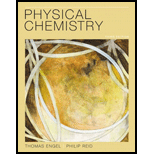
(a)
Interpretation: The value of heat, work done, change in internal energy, change in entropy and change in enthalpy needs to be determined if a gas undergoes a reversible adiabatic expansion and final pressure is 1/3rd of the initial.
Concept Introduction:
The change in enthalpy for a process can be calculated as follows:
Here,
Also, the change in internal energy as follows:
Here,
Also,
Here, q is heat and w is work done.
The ideal gas equation is represented as follows:
Here, P is pressure, V is volume, n is number of moles, R is Universal gas constant and T is temperature.
(b)
Interpretation: The value of heat, work done, change in internal energy, change in entropy and change in enthalpy needs to be determined if a gas undergoes an adiabatic expansion at constant external pressure and final pressure is 1/3rd of the initial volume.
Concept Introduction:
The change in enthalpy for a process can be calculated as follows:
Here,
Also, the change in internal energy as follows:
Here,
Also,
Here, q is heat and w is work done.
The ideal gas equation is represented as follows:
Here, P is pressure, V is volume, n is number of moles, R is Universal gas constant and T is temperature.
(c)
Interpretation: The value of heat, work done, change in internal energy, change in entropy and change in enthalpy needs to be determined if a gas undergoes an expansion at zero external pressure and final pressure is 1/3rd of the initial volume.
Concept Introduction:
The change in enthalpy for a process can be calculated as follows:
Here,
Also, the change in internal energy as follows:
Here,
Also,
Here, q is heat and w is work done.
The ideal gas equation is represented as follows:
Here, P is pressure, V is volume, n is number of moles, R is Universal gas constant and T is temperature.
Want to see the full answer?
Check out a sample textbook solution
Chapter 5 Solutions
Physical Chemistry
 ChemistryChemistryISBN:9781305957404Author:Steven S. Zumdahl, Susan A. Zumdahl, Donald J. DeCostePublisher:Cengage Learning
ChemistryChemistryISBN:9781305957404Author:Steven S. Zumdahl, Susan A. Zumdahl, Donald J. DeCostePublisher:Cengage Learning ChemistryChemistryISBN:9781259911156Author:Raymond Chang Dr., Jason Overby ProfessorPublisher:McGraw-Hill Education
ChemistryChemistryISBN:9781259911156Author:Raymond Chang Dr., Jason Overby ProfessorPublisher:McGraw-Hill Education Principles of Instrumental AnalysisChemistryISBN:9781305577213Author:Douglas A. Skoog, F. James Holler, Stanley R. CrouchPublisher:Cengage Learning
Principles of Instrumental AnalysisChemistryISBN:9781305577213Author:Douglas A. Skoog, F. James Holler, Stanley R. CrouchPublisher:Cengage Learning Organic ChemistryChemistryISBN:9780078021558Author:Janice Gorzynski Smith Dr.Publisher:McGraw-Hill Education
Organic ChemistryChemistryISBN:9780078021558Author:Janice Gorzynski Smith Dr.Publisher:McGraw-Hill Education Chemistry: Principles and ReactionsChemistryISBN:9781305079373Author:William L. Masterton, Cecile N. HurleyPublisher:Cengage Learning
Chemistry: Principles and ReactionsChemistryISBN:9781305079373Author:William L. Masterton, Cecile N. HurleyPublisher:Cengage Learning Elementary Principles of Chemical Processes, Bind...ChemistryISBN:9781118431221Author:Richard M. Felder, Ronald W. Rousseau, Lisa G. BullardPublisher:WILEY
Elementary Principles of Chemical Processes, Bind...ChemistryISBN:9781118431221Author:Richard M. Felder, Ronald W. Rousseau, Lisa G. BullardPublisher:WILEY





